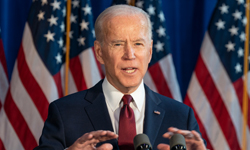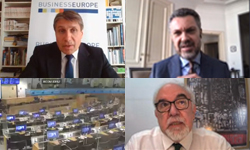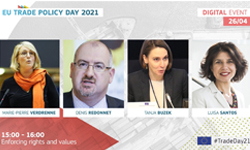BusinessEurope Headlines No. 2021-14
President Gattaz shares industry views with Commissioner Breton

On 28 April, BusinessEurope President Pierre Gattaz exchanged views with the European Commissioner for Internal Market Thierry Breton on the upcoming European Commission’s updated industrial strategy. For BusinessEurope, it is crucial that Europe avoids putting disproportionate extra burden on companies’ shoulders, if we want to fully grasp the unprecedented financial resources put in place for a solid recovery. For example, future proposals on due diligence and sustainable corporate governance can damage the recovery if they are badly shaped. To support European industry, we must keep the EU open to trade and investment, secure industrial competitiveness in the “Fit-for-55” package, and ensure EU standards, indispensable for the success in digital and green transitions, are driven by stakeholders. Finally, it is crucial to improve state aid rules for important projects of common European interest (IPCEI), key to encourage public and private investment.
Contact: Daniele Olivieri
Our comment
Window of opportunity
By Eleonora Catella, Deputy Director for International Relations
 After the turbulent Trump years, the corridors (or rather Zoom meetings) of Brussels are once more buzzing talks of a transatlantic “honeymoon” and a “window of opportunity”. Though it may seem old wine in new bottles, this is in fact a refreshing change of pace. We clearly see that the transatlantic relationship is much more positive and there is a commitment from both sides to work together and explore new areas of cooperation. A good example was the coordinated action on 22 March from the EU, the US, Canada and the UK to sanction several Chinese officials in connection to human rights violations in the Xinjiang Province. The participation of President Biden in the March European Council meeting has been another strong and visible sign that this US administration is keen to renew the strategic alliance with the EU and willing to engage in Transatlantic cooperation.
After the turbulent Trump years, the corridors (or rather Zoom meetings) of Brussels are once more buzzing talks of a transatlantic “honeymoon” and a “window of opportunity”. Though it may seem old wine in new bottles, this is in fact a refreshing change of pace. We clearly see that the transatlantic relationship is much more positive and there is a commitment from both sides to work together and explore new areas of cooperation. A good example was the coordinated action on 22 March from the EU, the US, Canada and the UK to sanction several Chinese officials in connection to human rights violations in the Xinjiang Province. The participation of President Biden in the March European Council meeting has been another strong and visible sign that this US administration is keen to renew the strategic alliance with the EU and willing to engage in Transatlantic cooperation.
Aside from joint multilateral efforts, there has also been an easing of some of the existing bilateral EU-US trade issues. These last weeks, positive discussions have taken place between USTR Katherine Tai and Executive Vice-President Dombrovskis to find a long-term solution to the Airbus/Boeing dispute following a welcome four-month suspension of tariffs. Commerce Secretary Gina Raimondo and Justice Commissioner Didier Reinders are also intensifying talks to try to find a legal framework that can replace the Privacy Shield while complying with the European Court of Justice ruling in the Schrems II case.
However, many trade irritants remain unsolved. Four years with the Trump administration have left the transatlantic relationship with scars that resemble those impressed by a jellyfish sting: the wound keeps burning long after the tentacles have been removed. It is not only a matter of broken trust: Trump-era duties on European imports of steel and aluminium are still in place. Unless a negotiated solution is found, they could again be a source of friction in June when the EU is expected to increase its countermeasures on some US imports. Another irritant could potentially emerge in the field of taxation. The USTR has launched section 301 investigations against Austria, Italy and Spain that could potentially lead to exports from these countries being subject to additional duties in the US. In turn, the European Commission is expected to present a legislative proposal in June that could lead to yet another USTR investigation.
In a speculative analysis over the direction the transatlantic relationship can evolve towards in the next few years, these are starting points to take into consideration. In addition, the EU and the US will have to deal with other priority issues like competitiveness, climate change and global supply chains. While the domestic debate over how to address them is ongoing, the degree of convergence of the respective policy choices may shape the transatlantic relationship – and beyond.
How to boost the competitiveness of domestic industry will be a central thought on both sides of the Atlantic. In the US, trade will be lower on the priorities list than recovery, competitiveness and security of workers. Any trade policy measure will be weighed based on the contribution it can give to the latter two. Both the EU and the US have an interest and political will to ensure a level playing field with third countries, not only on social aspects, but also on environmental ones, and this may help in the fight against climate change. Finally, the pandemic has dramatically exposed how easily supply chains can be disrupted, so reforms on either side will be geared around increasing their resilience and sustainability.
Interestingly, none of these priority issues can be met with a sustainable and effective solution without the active participation of China in the shaping of said solution. China is too big an actor not to take an active role, just like it is too important a player in international trade to keep claiming a “developing country” status. Far from proposing a position of “equidistance” between the US and China, we think that China will need to be at the table when we discuss the rules governing international trade in the years to come. But we are not naïve to think that China will accept easily a change in the status-quo that has been so favourable to its interests.
The challenges ahead are many, but thankfully so are the opportunities. It is important that the EU and the US manage to work together, even though reasons for occasional discontent may remain or arise. For example, in January, President Biden issued a “Made in America” executive order that, in scope, goes much further than the Trump Administration ever did and is at odds with the need to reignite economic growth worldwide to help our economies recovering faster from COVID-19.
This initiative is a worrying sign of domestic political concerns trumping strategic trade links with Europe and other regions. However, European business still expects an enhanced multilateral political cooperation and engagement with the US. And in this regard, the US re-joining the Paris climate agreement and the World Health Organisation are clear steps in the right direction.
The EU and the US have indicated they want to walk again together, but they have not yet chosen the path. The transatlantic business community pledges cooperation to the EU and US authorities on shared goals, including on digital, taxation and climate, responding to the COVID 19 pandemic, developing a common approach to protecting critical technologies, and enabling innovation.
On those areas where there is convergence of views and interests – and there is plenty to choose from – developing a positive transatlantic agenda is an urgent matter. Conversely, if the US and the EU fail to seize the opportunity for joint leadership and cooperation, leaving room for others, the loss will be on our citizens and our business. This would be a strategic mistake that cannot be pinned on past administrations. The responsibility – as well as the window of opportunity – is here and now.
* Article initially published at DVZ
Contact: Eleonora Catella
Active companies and workers are key for a solid recovery
 Now is the time to make the next steps and pave the way to a solid recovery. Steps which build long-term competitiveness and empower companies to engage in a growth and employment intensive green and digital transition. Enterprises are key to achieving Europe’s ambitions. To overcome common European social challenges, we need a trustful cooperation between the European Commission, EU Member States, and social partners. Together, we need to facilitate job-creating investment and reform our labour markets and social systems to ensure future prosperity. EASE, the Commission recommendation on effective active support to employment is a step in the right direction. This is the right focus nowadays, because after more than a year of economic and social hardship caused by various phases of COVID-19 related lockdowns or other restrictive measures, Europe needs to go back to work. These were the key messages of Markus Beyrer, BusinessEurope Director General, at the event organised by the European Economic and Social Committee on 28 April on “Porto Social Summit - a New Impetus to Europe’s social commitment”.
Now is the time to make the next steps and pave the way to a solid recovery. Steps which build long-term competitiveness and empower companies to engage in a growth and employment intensive green and digital transition. Enterprises are key to achieving Europe’s ambitions. To overcome common European social challenges, we need a trustful cooperation between the European Commission, EU Member States, and social partners. Together, we need to facilitate job-creating investment and reform our labour markets and social systems to ensure future prosperity. EASE, the Commission recommendation on effective active support to employment is a step in the right direction. This is the right focus nowadays, because after more than a year of economic and social hardship caused by various phases of COVID-19 related lockdowns or other restrictive measures, Europe needs to go back to work. These were the key messages of Markus Beyrer, BusinessEurope Director General, at the event organised by the European Economic and Social Committee on 28 April on “Porto Social Summit - a New Impetus to Europe’s social commitment”.
Contact: Maxime Cerutti
Increasing trade benefits: enforcing rights and seizing opportunities
 “To increase the benefits of trade for European companies, especially SMEs, the EU needs to focus on enforcing rights, ensuring trading partners respect their commitments. At the same time, the EU must continue to seize trade and investment opportunities in third markets through an ambitious bilateral negotiation agenda and an efficient market access strategy”, said Luisa Santos, BusinessEurope Deputy Director General, during the Trade Policy Day 21 that took place on 26 April. Regarding autonomous enforcement tools, Santos stated that they work as a deterrent and a way to mitigate existing market distortions, but that we are more effective if in the end we don’t have to use these tools. “It would be extremely harmful if the EU is perceived as a belligerent partner that is more interested in picking a fight than finding a negotiated solution. The EU should have a proportionate and targeted approach when using all these tools and they should be in line with the EU’s international commitments”, she said.
“To increase the benefits of trade for European companies, especially SMEs, the EU needs to focus on enforcing rights, ensuring trading partners respect their commitments. At the same time, the EU must continue to seize trade and investment opportunities in third markets through an ambitious bilateral negotiation agenda and an efficient market access strategy”, said Luisa Santos, BusinessEurope Deputy Director General, during the Trade Policy Day 21 that took place on 26 April. Regarding autonomous enforcement tools, Santos stated that they work as a deterrent and a way to mitigate existing market distortions, but that we are more effective if in the end we don’t have to use these tools. “It would be extremely harmful if the EU is perceived as a belligerent partner that is more interested in picking a fight than finding a negotiated solution. The EU should have a proportionate and targeted approach when using all these tools and they should be in line with the EU’s international commitments”, she said.
Contact: Luisa Santos
EU-UK: European Parliament ratification ends uncertainty for business
 The European Parliament on 28 April ratified the EU trade and cooperation agreement (TCA) with the United Kingdom, just a few days before the end of its provisional application. This finally brings clarity and legal certainty to the European business community and creates a solid platform for constructive cooperation between the EU and the UK.
The European Parliament on 28 April ratified the EU trade and cooperation agreement (TCA) with the United Kingdom, just a few days before the end of its provisional application. This finally brings clarity and legal certainty to the European business community and creates a solid platform for constructive cooperation between the EU and the UK.
BusinessEurope President Pierre Gattaz said: "European business welcomes the ratification of the EU-UK TCA. The UK is the third biggest trading partner of the EU, which makes this deal one of the most important trade agreements the EU has ever finalised. The positive vote of the European Parliament removes a major element of uncertainty, while companies on both sides are still adjusting to the new reality of trading while struggling with the COVID-19 challenges."
He added: "The agreement covers many areas that will have a strong impact on the competitive environment for EU and UK companies, ranging from climate change mitigation to digital transformation, competition, or standards. It is now urgent that both sides put in place the governing and implementing bodies under the agreement opening the path for smooth implementation and structured cooperation. The business community stands ready to engage and contribute actively to this process."
Contact: Luisa Santos
Taking inspiration from global partners in the search for skilled workers
 The EU needs a well-functioning economic migration policy that complements existing national approaches and which is based on the better coordination of national policies in order to attract and retain skilled migrants. In this regard, inspiration can be taken from economic migration policies in other world regions, including Canada, which has developed a demand-led talent pool to match skilled migrants with job vacancies. This was a key message from Maxime Cerutti, Director of Social Affairs, during a conference about global approaches to migration with a particular focus on transatlantic perspectives, which took place on 22 April. With a view to strengthening the EU’s economic migration policy, BusinessEurope welcomes the European Commission’s ongoing exploratory work that is looking at how such a talent pool concept could be adapted to the EU context. There is a need to better attract and match third country migrants of all skill levels with vacancies in the EU, including a particular focus on the highly skilled. Key factors in successfully achieving this will be to improve the availability of real-time data on skills needs and shortages across all sectors of economic activity, as well as a better understanding of third country qualifications.
The EU needs a well-functioning economic migration policy that complements existing national approaches and which is based on the better coordination of national policies in order to attract and retain skilled migrants. In this regard, inspiration can be taken from economic migration policies in other world regions, including Canada, which has developed a demand-led talent pool to match skilled migrants with job vacancies. This was a key message from Maxime Cerutti, Director of Social Affairs, during a conference about global approaches to migration with a particular focus on transatlantic perspectives, which took place on 22 April. With a view to strengthening the EU’s economic migration policy, BusinessEurope welcomes the European Commission’s ongoing exploratory work that is looking at how such a talent pool concept could be adapted to the EU context. There is a need to better attract and match third country migrants of all skill levels with vacancies in the EU, including a particular focus on the highly skilled. Key factors in successfully achieving this will be to improve the availability of real-time data on skills needs and shortages across all sectors of economic activity, as well as a better understanding of third country qualifications.
Contact: Robert Plummer
Improving social partner involvement in employment policies
 To encourage job creation by employers, Europe must move beyond purely short-term crisis response. It should address forcefully the structural weaknesses that penalise our companies when competing with other companies globally. The main challenge is to ensure effective professional transitions. Making use of big data in employment services offers the potential to significantly increase the efficiency of skills matching based on accurate information on labour market trends and needs, also taking into account regional and local contexts. As the European Commission recently published its recommendation on Effective Active Support to Employment - EASE, the time is ripe for a strengthened partnership between employment policy actors and the European social partners. The recovery context reinforces the relevance of BusinessEurope’s proposal to create a new tripartite advisory committee on employment. Better cooperation between public and private employment services is also an important building block to achieve better performing labour markets. These were the key messages from Maxime Cerutti, Director of Social Affairs, during the annual conference of the European network of Public Employment Services on 21 April, which focused on the role of partnerships.
To encourage job creation by employers, Europe must move beyond purely short-term crisis response. It should address forcefully the structural weaknesses that penalise our companies when competing with other companies globally. The main challenge is to ensure effective professional transitions. Making use of big data in employment services offers the potential to significantly increase the efficiency of skills matching based on accurate information on labour market trends and needs, also taking into account regional and local contexts. As the European Commission recently published its recommendation on Effective Active Support to Employment - EASE, the time is ripe for a strengthened partnership between employment policy actors and the European social partners. The recovery context reinforces the relevance of BusinessEurope’s proposal to create a new tripartite advisory committee on employment. Better cooperation between public and private employment services is also an important building block to achieve better performing labour markets. These were the key messages from Maxime Cerutti, Director of Social Affairs, during the annual conference of the European network of Public Employment Services on 21 April, which focused on the role of partnerships.
Contact: Anna Kwiatkiewicz-Mory
Implementation of European social partners framework agreement on digitalisation underway
 On 27 April, the European social partners organised a seminar on implementation of their framework agreement on digitalisation, which was adopted one year ago. The event was part of European social partners project activities with funding from the social dialogue budget line of the European Commission Directorate-General for Employment, Social Affairs and Inclusion. With over 80 participants representing EU and national level social partners, the level of interest is clearly high. The agreement was highlighted not only as a way of jointly grasping the opportunities and dealing with the challenges of digitalisation on labour markets, but also timely in the current context. While this is only the start of the process, there are already encouraging signs from social partners at national level. Implementation actions will no doubt be diverse, depending on the starting point of different countries, industrial relations systems, and priorities. The European social partners encouraged their respective members to continue on this good path and pledged their support to the process.
On 27 April, the European social partners organised a seminar on implementation of their framework agreement on digitalisation, which was adopted one year ago. The event was part of European social partners project activities with funding from the social dialogue budget line of the European Commission Directorate-General for Employment, Social Affairs and Inclusion. With over 80 participants representing EU and national level social partners, the level of interest is clearly high. The agreement was highlighted not only as a way of jointly grasping the opportunities and dealing with the challenges of digitalisation on labour markets, but also timely in the current context. While this is only the start of the process, there are already encouraging signs from social partners at national level. Implementation actions will no doubt be diverse, depending on the starting point of different countries, industrial relations systems, and priorities. The European social partners encouraged their respective members to continue on this good path and pledged their support to the process.
![]() Contact: Rebekah Smith
Contact: Rebekah Smith
Calendar 
- 30 April: Event on the EU-Mercosur Agreement - EU and Brazilian Business Committed to Sustainability
- 3 May: Seminar "Challenges in global security and the future of transatlantic relations"
- 6 May: High-level conference on a proposal for a Corporate Sustainability Reporting Directive – the way forward
- 8 May: EU-India Business Round Table
Not yet a subscriber? Register here.
Reminder: please have a look at our privacy policy